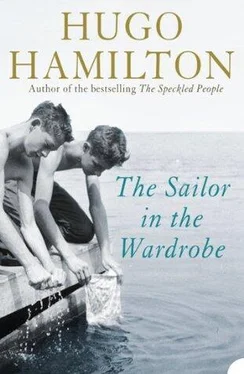It was only on the way back that we stopped at Toehead, but there was nothing much there. It’s just a piece of grassy land going out into the sea. Hard to believe that 300 families once lived here. There must have been so many people walking along the roads in those days. It must have been busy as a city, and now it was all emptiness. There was nothing at all on Toehead, only a few houses at the foot of the slope going up. Barren place now, I remembered reading in the black notebook. There was nothing else for us to remember. We went right out to the tip of the headland and stood looking out over the cliffs going down on each side of the headland. We saw seagulls diving down into the water. We saw lines of foam on top of the waves. Boats were going out fishing from the harbour at Union Hall. A man with a pitchfork on his shoulder was walking inland with his dog, as if he was the last person left alive. There was a strong wind up there because it was so exposed to the Atlantic. When you shouted, the wind just whipped the sound of it away out to sea and made you speechless. The noise of wind in my ears made it impossible to hear anything. At one point I thought I heard people shouting and crying. I thought I heard the sound of hoofs and looked up to see if it was the landlord in his fiery carriage, but I knew it was an illusion.
I had the weakness, like an ache in my legs, and lay down on the grass in a place that was sheltered from the wind. Franz stayed looking out across the sea while I lay on my back looking straight up at the sky and the small white clouds going by very fast above us, as if the land was moving under me. I was floating on my back, head-first inland. I wondered how much you could remember and where the line is drawn between memory and imagination. Could you remember things that you have not seen, could you re-imagine things that you were told and relive them as if they happened only yesterday? I knew that I was lying on the land where people had been evicted long ago before I was born. I could imagine them alive. I could imagine the smell of turf smoke drifting on the wind and I could imagine the sound of people talking in Irish all around Toehead. I closed my eyes and listened to the wind and the sound of the Irish language all around me like a blanket.
I didn’t want to go anywhere. I didn’t want to get back on the bike again because I had cycled so much that I was tired and wanted to stay in one place for the rest of my life. I felt the weakness, like an ache in my legs. I was paralysed and wanted to be left there. I didn’t care if it rained or got dark, I was ready to give myself up and surrender. I must have fallen asleep for a moment, because I heard my brother’s voice calling me and saying we should move on before it got too late. I woke up and didn’t even know where I was or what time it was or where I was in history. I opened my eyes and saw nothing but the sky and the clouds in front of me, moving at great speed away out into the sea.
‘Come on,’ Franz said. ‘We want to get back to Middleton before dark.’
I got back on the bike with stiff legs. I was thankful that we were going downhill, off the headland for once. We stopped and turned around one last time to look at the view. It was unforgettable, with only the birds and the sheep and the Atlantic ocean spreading out like a big flat mirror.
On the night before Tante Käthe goes back home to Germany, Onkel Ted comes out to the house and my mother has baked another cake. Onkel Ted tells Tante Käthe that Stefan would soon be back, please God. We would all pray for him, and it would not be long before he would be in touch again. Onkel Ted was able to speak calmly and trust in the future. He’s good at speaking German and even when Tante Käthe says she’s afraid of what’s happening in Northern Ireland and all the car bombs that are starting to go off, he listens to her and lets her talk out her worst nightmares. She’s afraid of war and bombing coming back. She’s afraid Stefan might have gone up there by mistake and that something has happened to him, like the German nightmare factory. She can’t believe that the violence in the North will not spread all over the country and that Stefan will not be caught up in it.
But then Onkel Ted’s calmness spreads all around the house and even the worst fears start floating away like music. Everyone becomes weightless when he speaks. He tells her that history is being repaired in Ireland, and that even though the troubles have broken out in Northern Ireland, it doesn’t mean we are all at war again. He tells her the story about Tante Roseleen, when she was a small girl and there was an ambush around the creamery where she lived near Cork, in a place called Kilumney. It was the Black and Tans on one side and the IRA on the other. The family had fled from the house but when they came back, there were bullet holes in the walls. The bullet holes were never filled in or plastered over, so when Tante Roseleen was growing up and playing outside the creamery, she used to hide sweets in them.
‘Sweets in the bullet holes,’ Onkel Ted says.
It’s what children do with the history of their country and all the bad things that have happened in the past. All over Europe, there must be children doing the same thing. Wherever there are bullet holes and bomb damage, there will also be children filling the holes up again, sticking their fingers in or putting in little stones, hiding their sweets and making up stories around them. I can see my mother and Tante Käthe both smiling with tears in their eyes, because the story of the bullet holes is so sad and happy at the same time, because children forget the real damage that was done and start repairing things with their imagination.
The harbour is quiet. For a moment it’s like a silent movie and there’s not even the sound of a distant engine to be heard. The world has stalled briefly and all that’s left are the tiny, insignificant harbour sounds, like the water underneath the boats, the squeak of a tyre fender when it’s pushed up against the harbour wall, the creak of a rope being stretched to the limit, the little rattle and shake that it makes and the misty shower of water wrung out by the strain. The harbour goes into a daydream and all your faculties go to sleep.
The sun is shining across the water and the reflection is so strong that you can hardly see without tears. Even closing your eyes is not enough and you have to turn away. The old people are down from the nursing home to spend the afternoon on the quay watching the boats. The nurses are with them, making sure their blankets are tucked in around them in their wheelchairs, making sure the brakes are on and they don’t roll away into the harbour without anyone noticing them gone. There is an old woman asleep with a kind of baker’s hat on her head and sunglasses gone sideways on her face. An old man in a wheelchair beside her who keeps his hand up as if he’s waving at somebody out at sea. There is a tall man who has to link arms with a nurse because he’s always trying to run away. The nurses told Packer once that he escaped from the retirement home one day and got the bus into town and it was nearly midnight before he was found sitting on the pavement in the city, drunk and singing. One night they caught him with his trousers on back to front, trying to break out through the window. The nurses bring flasks of tea and coffee, and distribute fairy cakes. They tell us how mean the nuns are with their tea bags and their allsorts biscuits. They tell us about the boy who was working in the kitchen and got a whole pan full of boiling chip oil over his face and hands, screaming as they carried him out into the ambulance. They tell us about the famous old people who are living there now and how they are forgotten by everyone, because time moves on and leaves all these people behind.
Читать дальше
Конец ознакомительного отрывка
Купить книгу












